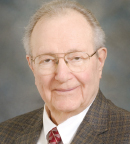THE AMERICAN Association for Cancer Research (AACR) recognized Emil J Freireich, MD, FAACR, with the 2019 AACR Award for Lifetime Achievement in Cancer Research at the opening ceremony of this year’s AACR Annual Meeting.

Emil J Freireich, MD, FAACR
Dr. Freireich was honored for his work in establishing combination chemotherapy and neoadjuvant therapy as powerful weapons in treating childhood acute lymphoblastic leukemia (ALL). His discovery that multiple drugs given simultaneously, both during the initial course of treatment and for a year after the patient is in remission, helped transform childhood leukemia into a type of cancer that can often be cured. Dr. Freireich’s discoveries are still used in clinical practice, and survival rates for childhood leukemia exceed 90%.
The AACR Award for Lifetime Achievement in Cancer Research was established in 2004 to honor individuals who have made contributions to cancer research, either through a single scientific discovery or a collective body of work. These contributions, whether they have been in research, leadership, or mentorship, must have had a lasting impact on the field of oncology and must have demonstrated a lifetime commitment to progress against cancer.
Clinical Research and Professional Background
IN 2015, Dr. Freireich retired from his roles as Professor in the Department of Leukemia, Division of Cancer Medicine, and Director of the Adult Leukemia Research Program at The University of Texas MD Anderson Cancer Center, Houston. His contributions to the treatment of leukemia began in the 1950s, when he proved that fresh blood rich in platelets was more effective in preventing hemorrhages than older blood that came from blood banks. He also developed the treatment strategy of early intensification; performed the first leukocyte transfusion to show that peripheral blood stem cells could be engrafted, thus leading to allogeneic bone marrow grafts; and developed the first continuous-flow blood cell separator.
Dr. Freireich earned both his bachelor’s degree and medical degree from the University of Illinois in Chicago. He practiced medicine at Chicago hospitals and then did a fellowship in hematology at Massachusetts Memorial Hospital in Boston. In 1953, he was drafted into the U.S. Army but was allowed to serve by working at the National Institutes of Health. There, he conducted his earliest groundbreaking research on ALL.
In 1965, he joined MD Anderson, where he oversaw the physician-scientist training program and helped develop the curriculum. Since his retirement, he has remained involved in MD Anderson’s medical education program.
Dr. Freireich was inducted as a Fellow of the AACR Academy in 2014. He has been recognized with countless career awards. ■

